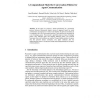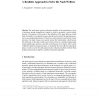326 search results - page 22 / 66 » Using Socially Deliberating Agents in Organized Settings |
CSCW
2008
ACM
13 years 8 months ago
2008
ACM
This study examines visitors' use of two different electronic guidebook prototypes, the second an iteration of the first, that were developed to support social interaction bet...
ICMI
2003
Springer
14 years 1 months ago
2003
Springer
We present methods for inferring the cost of interrupting users based on multiple streams of events including information generated by interactions with computing devices, visual ...
ENC
2005
IEEE
14 years 2 months ago
2005
IEEE
Following the argumentation framework and semantics proposed by Dung, we are interested in the problem of deciding which set of acceptable arguments support the decision making in...
CLIMA
2004
13 years 10 months ago
2004
In this paper we propose a formal specification of a persuasion protocol between autonomous agents using an approach based on social commitments and arguments. In order to be flexi...
PAAMS
2009
Springer
14 years 1 months ago
2009
Springer
The multi-agent resource allocation problem is the negotiation of a set of resources among a population of agents, in order to maximize a social welfare function. The purpose of th...


